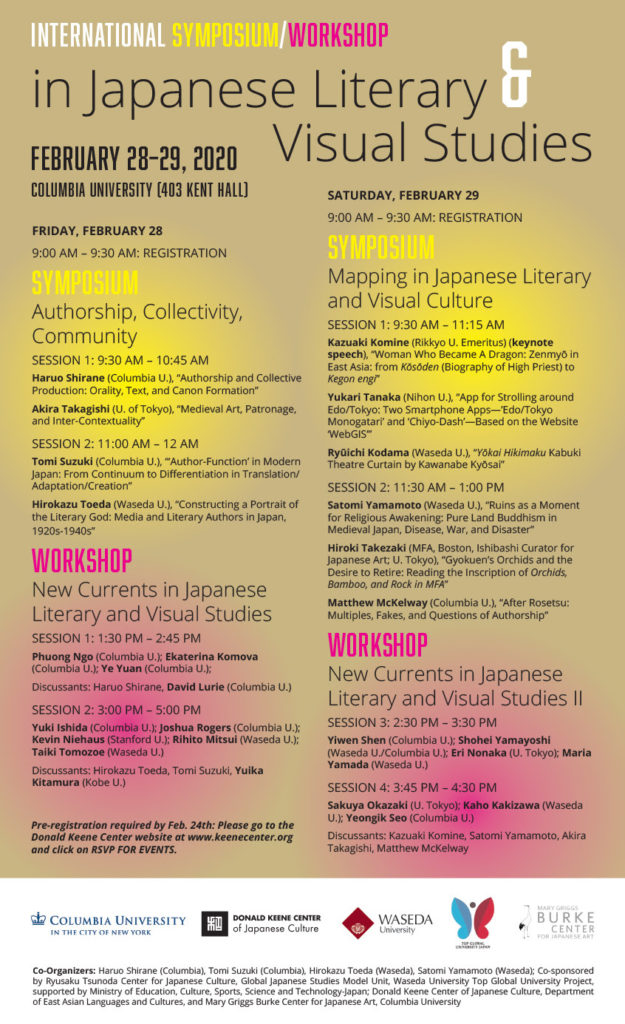
Dear Friends and Colleagues,
We welcome those who have pre-registered to attend the International Symposium and Workshop in Japanese Literary and Visual Studies. Please click here for the detailed program and schedule. Seating is first-come, first-served.
If you have received a ticket and can no longer attend, please click on “Manage Tickets” button in the email confirmation to cancel. This will allow us to release seats for others who are still on the Waiting List.
Friday-Saturday, February 28-29, 2020, Kent Hall, Room 403, Columbia University
International Symposium/Workshop in Japanese Literary and Visual Studies
February 28 (Friday), 2020, 9:30 AM – 5:00 PM
February 29 (Saturday), 2020, 9:30 AM – 5:10 PM
Registration for this symposium is now closed. For those still on the Waiting List, we appreciate your patience. Due to the large number of presenters and workshop participants, we cannot guarantee seating.
Co-Organizers: Haruo Shirane (Columbia), Tomi Suzuki (Columbia), Hirokazu Toeda (Waseda), Satomi Yamamoto (Waseda); Co-sponsored by Ryusaku Tsunoda Center for Japanese Culture, Global Japanese Studies Model Unit, Waseda University Top Global University Project, supported by Ministry of Education, Culture, Sports, Science and Technology-Japan; Donald Keene Center of Japanese Culture, Department of East Asian Languages and Cultures, Mary Griggs Burke Center for Japanese Art, Columbia University
Symposium: Authorship, Collectivity, Community
February 28, 9:30 AM – 12:00 PM
The age of new media (with its incessant borrowing, remixing, and trans-medial cross-overs) has led to a world in which cultural production often emerges out of groups and multiple meditators, raising the question of authorship and ownership. These issues are particularly relevant to East Asian culture, where copying, deliberate imitation, extensive borrowing, and collective creation have traditionally been central as pedagogical tools and as key modes of literary and cultural production. This is the fourth and final in a series of symposiums on the issues on authorship, following up on the earlier symposiums “Rethinking Authorship in Japan and the World” (March 2017) and “Japanese Theater, Publishing Culture, and Authorship” (March 2018).
Workshop: New Currents in Japanese Literary and Visual Studies I
February 28, 1:30 PM – 5:00 PM
Symposium: Mapping in Japanese Literary and Visual Culture
February 29, 9:30 AM – 1:00 PM
Maps represent geographical and three-dimensional space as flat surfaces. This transferal is deeply interrelated to the production and reception of literary and visual cultures. This session relates mapping to media, words, and representational figures with a view to exploring the relationship between this world and other worlds, city landscape, and the awareness of the broader spaces of regions and states.
Workshop: New Currents in Japanese Literary and Visual Studies II
February 29, 2:30 PM – 5:00 PM
Free and open to the public. www.keenecenter.org


